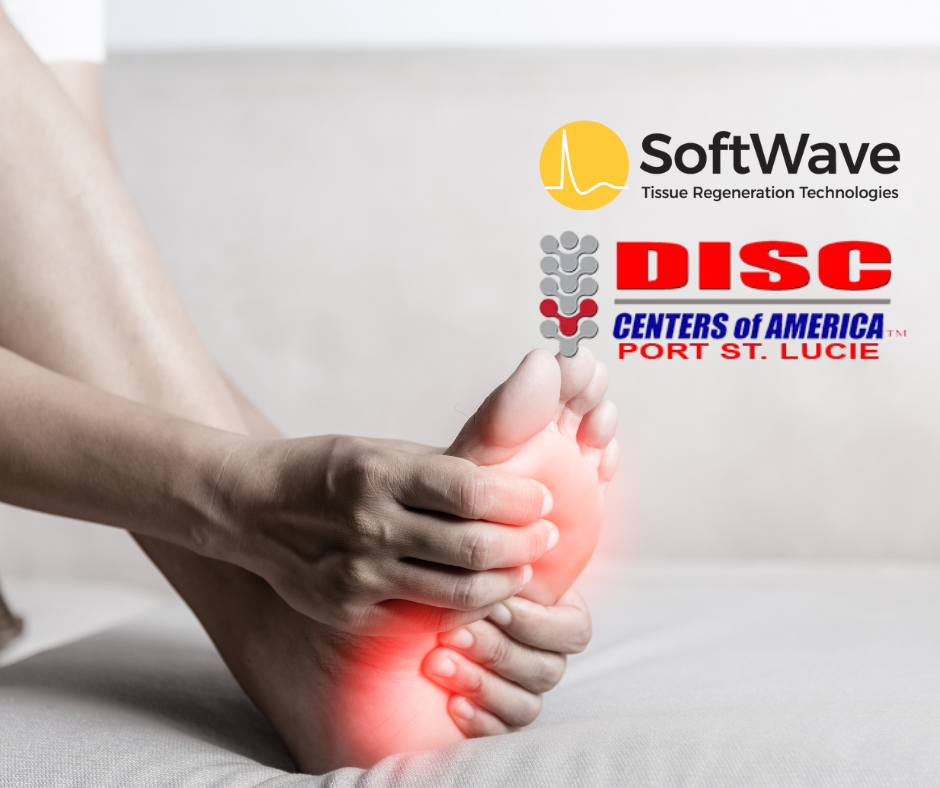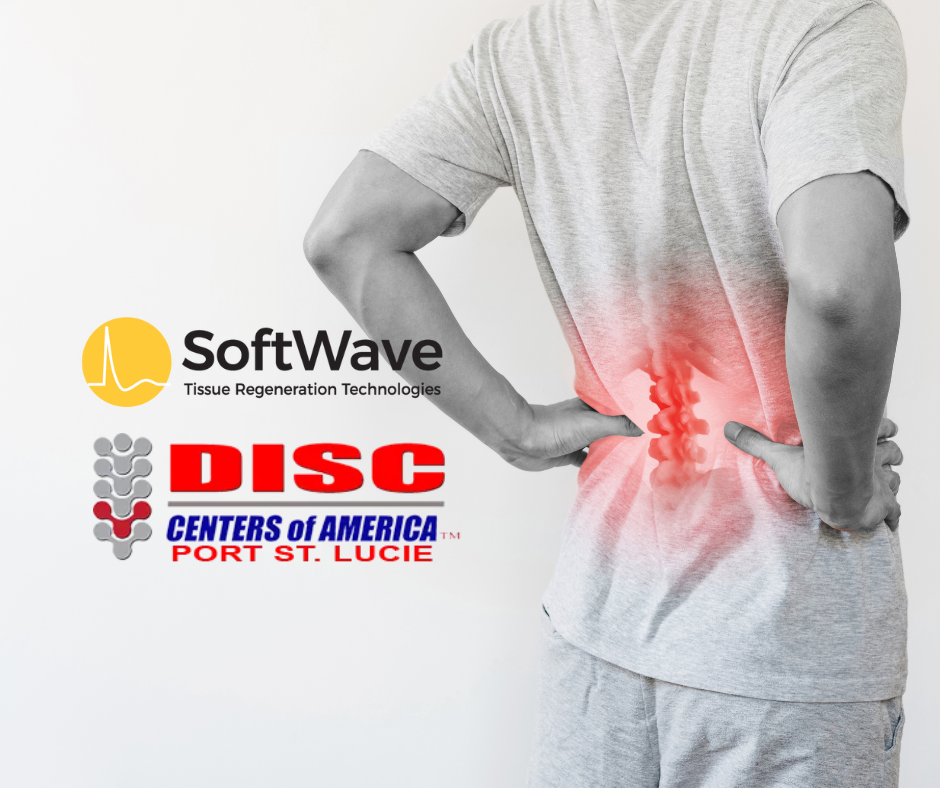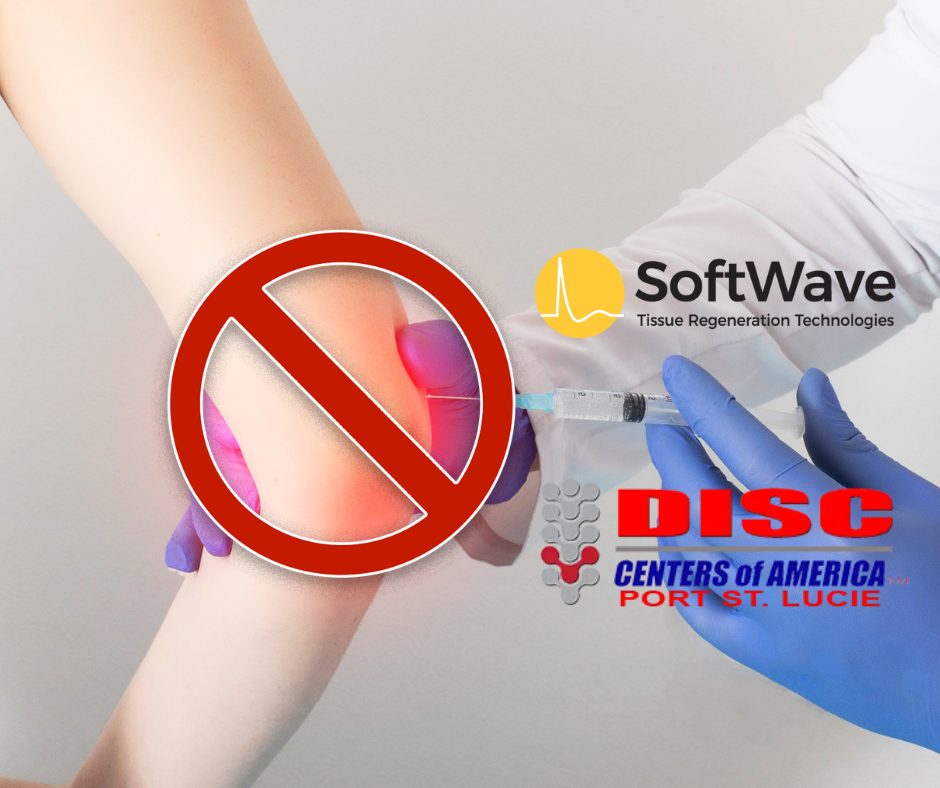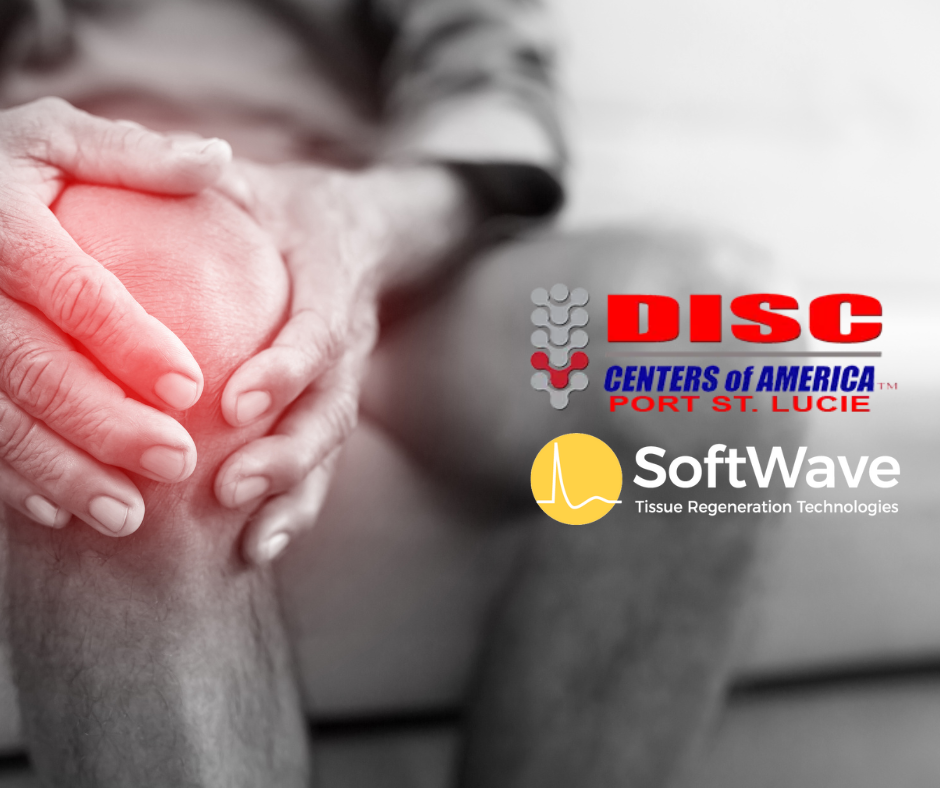Blog
Plantar Fasciitis Relief with SoftWave Tissue Regeneration Technology: A Non-Surgical, No Injections Solution with Dr. John Grassam

Plantar fasciitis is a common and painful condition that affects the heel and bottom of the foot, making it difficult to walk, exercise, or even perform daily tasks. If you’ve been dealing with persistent heel pain from plantar fasciitis, you know how debilitating it can be. Fortunately, SoftWave Tissue Regeneration Technology offers a non-invasive, drug-free solution that promotes healing, pain relief, and tissue regeneration. At Disc Centers of America - Port St. Lucie, Dr. John Grassam uses SoftWave Therapy to help patients recover from plantar fasciitis and regain mobility, allowing them to return to their active lifestyles.
In this blog, we’ll explore the causes and symptoms of plantar fasciitis and how SoftWave Therapy can help you achieve long-term relief and healing.
What is Plantar Fasciitis?
Plantar fasciitis occurs when the plantar fascia, a thick band of tissue that runs along the bottom of the foot, becomes inflamed or irritated. The plantar fascia acts as a shock absorber, supporting the arch of the foot and helping you walk. When it is overused or stressed, small tears can develop in the tissue, leading to pain, stiffness, and inflammation.
Symptoms of Plantar Fasciitis:
- Heel pain: Pain is often most severe in the morning or after periods of inactivity, improving as the foot warms up throughout the day.
- Stiffness: The bottom of the foot may feel tight, especially when walking after sitting for long periods.
- Tenderness: The area around the heel or the arch of the foot may feel tender to the touch.
Causes of Plantar Fasciitis:
- Overuse: Activities that place repeated stress on the foot, such as running, jumping, or standing for long periods, can cause plantar fasciitis.
- Improper footwear: Wearing shoes that lack proper arch support or cushioning can increase the risk of developing plantar fasciitis.
- Flat feet or high arches: Foot structure plays a role, as individuals with flat feet or high arches are more prone to plantar fasciitis.
- Age: As we age, the plantar fascia can lose flexibility and strength, increasing the likelihood of injury.
How SoftWave Tissue Regeneration Technology Can Help Heal Plantar Fasciitis
SoftWave Therapy is a non-invasive treatment that uses supersonic acoustic waves to stimulate the body’s natural healing processes, making it an effective option for treating plantar fasciitis. This advanced therapy offers pain relief, promotes tissue regeneration, and speeds up recovery without the need for surgery, injections, or medications.
1. Reducing Pain and Inflammation
Plantar fasciitis is characterized by inflammation and microtears in the plantar fascia, leading to pain and discomfort in the heel and arch of the foot. SoftWave Therapy delivers acoustic waves to the affected area, helping to:
- Modulate inflammation: SoftWave Therapy reduces the production of pro-inflammatory cytokines and promotes the release of anti-inflammatory molecules, helping to reduce swelling and alleviate pain.
- Provide immediate pain relief: Many patients experience immediate improvements in pain after their first SoftWave session, allowing them to walk and move more comfortably.
By addressing the root cause of the pain, SoftWave Therapy provides long-lasting relief for individuals suffering from plantar fasciitis.
2. Stimulating Tissue Repair and Regeneration
One of the key benefits of SoftWave Therapy is its ability to promote tissue regeneration and repair. The acoustic waves used during treatment trigger several biological responses that help the plantar fascia heal more efficiently:
- Activation of stem cells: SoftWave Therapy stimulates resident stem cells, which are critical for the repair and regeneration of damaged tissues. These stem cells migrate to the injured plantar fascia, helping to repair microtears and promote long-term healing.
- Improved blood flow: The therapy also promotes the formation of new blood vessels (angiogenesis), improving circulation and delivering oxygen and nutrients to the injured tissue, speeding up the recovery process.
By promoting cellular repair, SoftWave Therapy helps the plantar fascia heal and strengthens the tissue to reduce the risk of future injury.
3. Restoring Mobility and Function
Plantar fasciitis can severely limit your ability to walk, run, or perform daily activities. As the pain and inflammation subside and the tissue heals, patients often experience a significant improvement in mobility and function. SoftWave Therapy works to:
- Restore flexibility: By reducing inflammation and promoting tissue repair, SoftWave Therapy helps improve the flexibility and strength of the plantar fascia, making it easier to move without pain.
- Enhance overall foot function: As the plantar fascia heals, patients experience a reduction in stiffness and an improvement in range of motion, allowing them to walk and stand for longer periods without discomfort.
This restoration of mobility enables patients to return to their normal activities and enjoy a more active lifestyle.
Why Choose SoftWave Therapy for Plantar Fasciitis?
SoftWave Therapy offers several advantages for patients suffering from plantar fasciitis:
- Non-invasive and drug-free: SoftWave Therapy is a safe, non-surgical treatment that requires no medications or injections, making it a natural alternative to more invasive procedures.
- Long-lasting results: By promoting tissue regeneration and repair, SoftWave Therapy provides lasting relief from pain, reducing the likelihood of re-injury.
- Fast recovery: Many patients experience immediate improvements in pain and function after their first treatment, with continued improvements over time as the body heals.
Whether you’re dealing with the chronic pain of long-term plantar fasciitis or a more recent injury, SoftWave Therapy offers a proven, science-backed solution for healing and recovery.
What to Expect During Your SoftWave Therapy Session
At Disc Centers of America - Port St. Lucie, Dr. John Grassam and his team will begin by evaluating your symptoms and determining if SoftWave Therapy is the right treatment for your plantar fasciitis. Here’s what you can expect during your therapy session:
1. Mapping the Affected Area
The first step in treatment is a mapping session where Dr. John uses the SoftWave device to locate the hot spots of pain and inflammation in the plantar fascia. This allows for precise targeting of the affected tissue.
2. Treatment Delivery
During your SoftWave session, acoustic waves are delivered directly to the injured area of the foot, penetrating deep into the tissue to stimulate pain relief and tissue regeneration. Most sessions last between 10-15 minutes.
3. Continued Healing
After your initial treatment, the stem cells activated by SoftWave Therapy continue to work for weeks and months, promoting ongoing healing and regeneration. Many patients report ongoing improvements in pain reduction and mobility long after their final session.
Heal Your Plantar Fasciitis with SoftWave Therapy at Disc Centers of America - Port St. Lucie
If you’re tired of living with heel pain and are looking for a non-invasive, effective solution, SoftWave Therapy at Disc Centers of America - Port St. Lucie can help. Dr. John Grassam and his expert team are dedicated to helping you find lasting relief from plantar fasciitis and regain your mobility.
Contact Us Today for SoftWave Therapy
Ready to experience the benefits of SoftWave Therapy for plantar fasciitis? Contact Disc Centers of America - Port St. Lucie today to schedule your consultation with Dr. John Grassam.
Disc Centers of America - Port St. Lucie
555 NW Lake Whitney Place, Ste. 105
Port St. Lucie, FL 34986
Phone: 772-237-2080
Visit us at: https://portstluciedisccenter.com
Request an appointment here: https://www.softwaveportstlucie.com/contact
Let SoftWave Therapy help you heal from plantar fasciitis, reduce pain, and regain your ability to move pain-free!
‹ Back








 555 NW Lake Whitney Place Ste. 105
555 NW Lake Whitney Place Ste. 105